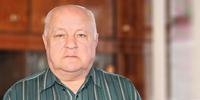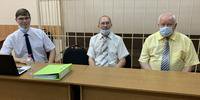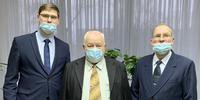Case of Shchepin and Others in Kirov
Filter
- #
The First Department for Investigation of Particularly Important Cases of the Investigative Committee of Russia for the Kirov Region initiates criminal proceedings for faith under Articles 282.2 (1), 282.2 (2); According to the investigation, together with others, he conducted worship services, which is interpreted as "organizing and participating in the activities of an extremist organization" (with reference to the decision of the Supreme Court of the Russian Federation to liquidate all 396 registered organizations of Jehovah's Witnesses). Innocent victims of law enforcement officers are: Andrey Shchepin (born in 1991), Alexander Shamov (born in 1960), Yevgeny Udintsev (born in 1949).
- #
Investigator Georgy Malykh charges Yevgeny Udintsev with organizing the activities of an "extremist organization." The 70-year-old believer faces up to 10 years in prison.
- #
The investigator for especially important cases, Lieutenant Colonel of Justice Georgy Malykh, notifies the defendants of the completion of investigative actions. Yevgeny Udintsev, Alexander Shamov, Andrey Shchepin and their lawyer begin to get acquainted with the materials of the criminal case.
- #
- #
The Leninsky District Court of Kirov begins consideration of the case on the merits against Yevgeny Udintsev, Alexander Shamov and Andrey Shchepin. The believers file petitions to adjourn the hearing, to suspend the criminal proceedings, and to return the case to the prosecutor. Judge S. W. Schweitzer rejects all the defendants' motions.
After the break, 71-year-old Yevgeny Udintsev leaves the meeting due to poor health. The hearing is postponed until June 25.
- #
The hearing is being held behind closed doors. Andrey Shchepin submits 4 motions: to suspend the proceedings due to the epidemiological situation, to terminate the case on the basis of the Opinion of the UN Working Group, to exclude acts of inspection of the site due to violations in its preparation, and to exclude search protocols conducted with procedural violations. Judge Sergei Schweitzer rejects all motions. The hearings will continue despite the continuing risk of coronavirus infection (70-year-old defendant Yevgeny Udintsev is at risk).
The next meeting will be held on July 15, 2020. The defense plans to file several more motions.
- #
The court examines religious literature with the headings "Do good", "Forgive generously" and the like.
The defense continues to announce motions to exclude evidence obtained in violation of the law. Among others, the defense petitions for the exclusion of the protocol of the interrogation of the prosecution witness Potekhin, an employee of the Center for Combating Extremism (CPE). About half of his testimony recorded in the protocol by the investigator coincides with the Wikipedia article on Jehovah's Witnesses, along with its typos and errors. Judge Sergei Schweitzer attaches an article from the Internet encyclopedia and the results of the check by the Anti-Plagiarism system, but refuses to exclude the protocol from the evidence.
The prosecutor announces the charge and reads out the materials from the three volumes of the criminal case. The defendants do not agree with the prosecution. The trial lasts about 8 hours. The next hearing is scheduled for August 14. It is planned to examine the written materials from the remaining 19 volumes, to interrogate prosecution witnesses and defendants.
- #
In the Leninsky District Court of Kirov, the study of the case materials continues. The prosecutor reads out three volumes of the criminal case, including transcripts of telephone conversations. The defendant submits a motion to exclude acts of inspections of the Internet site in connection with suspicion of their falsification. Judge Sergei Schweitzer postpones the consideration of this petition and decides to call the detective who drew up the dubious acts. The court hearing is adjourned due to a false report about the mining of the courthouse.
- #
In the Leninsky District Court of the city of Kirov, the hearing in the case of Shchepin and others continues. Volume No. 7, which includes transcripts of the believer's telephone conversations, is read out.
- #
In the Leninsky District Court of Kirov, the study of transcripts of telephone conversations of Andrei Shchepin continues. The defendants give explanations that refute the false accusations of 1) refusing treatment, 2) negatively assessing people who do not share their views, 3) destroying families, and 4) disobeying the authorities. From the telephone conversations recorded during the MPA, it is obvious that they turn to doctors for medical help and buy medicines. During the year of listening, the investigation did not record a single rude word addressed to non-Witnesses, on the contrary, believers support them and help in everyday matters: Shchepin helped a homeless man, paying his expenses for communication services and selecting vacancies. Shchepin draws attention to the content of conversations with his father and grandmother, which do not share his beliefs: the believer maintains warm relations with relatives. Talk about the need to be careful on the road and comply with traffic rules testify to law-abiding.
- #
In the Leninsky District Court of Kirov, the study of the case materials continues, the list of things seized during the search is read out.
The judge refuses the defense to attach to the case the statement of 30 OSCE member states, which on July 23, 2020 harshly criticized the repression of Jehovah's Witnesses unleashed by the Russian authorities.
Using the example of his alternative service, the believer proves that the accusations against Jehovah's Witnesses about inciting religious discord, calls for violence and disobedience to the authorities are unfounded. In particular, he explains that, wishing to remain honest in the eyes of both God and the state, he did alternative civilian service for 21 months, although he had the opportunity to receive a military ID if he agreed to participate in military training for only a month. Thus, Andrey proved that he respects the laws of the country and does not try to evade the fulfillment of his civic duty to society.
The trial will continue on November 3, 2020.
- #
The defendants file a motion to challenge prosecutor Kolosova. They believe that it endangers their lives and health by insisting on continuing meetings in the midst of the coronavirus pandemic. Despite doctors' recommendations to stay at home, elderly believers are forced to attend hearings. Judge Sergei Schweitzer rejects the motions to challenge the prosecutor and to suspend the court proceedings.
- #
Volumes 21--23 of the case are heard. The judge reads out the positive characteristics of the defendants. Andrey Shchepin received references from the gymnasium, from the place of alternative civilian service, from work and from the senior housekeeper. "Andrey is a person who is always ready to help, non-conflicting, non-aggressive, sociable," says one of the characteristics.
Witnesses for the prosecution of Bratukhin, an operative who participated in the fabrication of cases against believers, and an employee of the CPE Potekhin, are being interrogated. The latter explains that he has already retired. He answers the prosecutor's questions vaguely, vaguely, saying that he has already forgotten many details. He emphasizes that Jehovah's Witnesses take great care of the elderly, are ready to take them by car to the hospital, bring food, and much more.
- #
The interrogation of the employee of the CPE Potekhin continues. He cannot explain why, during the investigation phase, copied paragraphs from Wikipedia were included in his interrogation protocol.
Potekhin also talks in detail about the work of an agent named Plastin, introduced by the special services, who recorded and provided information about what was happening at the services.
Later it becomes known that Plastinov petitioned for the application of state protection measures against him as a witness for the prosecution. On this fact, Andrei Shchepin declares: "From the materials of the case, in principle, it is clear that we do not have any victims ... There can be no real threat from us."
- #
Prosecution witness Shikhov states that he did not give the first two sheets of testimony contained in the interrogation protocol, they were entered by the investigator. He adds that the interrogation lasted 3.5 hours and his blood pressure rose, it became bad, so he was ready to sign any documents, just to leave as soon as possible.
Zlobin's prosecution witness, a neighbor of Yevgeny Udintseva, also explains that a lot of things were added to her testimony that she did not say. For example, the fact that people went to Udintsev, he printed literature and received some boxes. Zlobina refutes these claims and says that Jehovah's Witnesses are good, smiling people. She would like everyone to be like that.
- #
The testimony is given by the prosecution witness Plastin, an embedded FSB agent who portrayed an interest in the Bible. He declares that Jehovah's Witnesses avoid associating with other faiths, although he immediately admits that although he is not a Jehovah's Witness, none of the believers have avoided communion with him.
- #
The interrogation of the secret witness is being prepared. Bailiffs and CPE officers block the corridor, blocking access to the courtroom so that no one can reveal the identity of the secret witness.
The defense objects and files a motion to disclose the identity of the witness. The basis for concealment can only be a real threat to life. The case file does not confirm the existence of any threats on the part of the defendants.
The court decides to question the witness without the possibility of visual observation, his voice is changed. By the way the witness formulates phrases, the defense has the impression that he is a law enforcement officer. A secret witness claims to be one of Jehovah's Witnesses himself. However, the literature he names has not been used by believers for more than four years.
- #
The defendants read excerpts from publications of Jehovah's Witnesses that deal with the topics of child protection, health care, and obedience to authority. The defendants also consider the history of Jehovah's Witnesses in Russia, noting that they existed and professed their faith even before the revolution of 1917, when they did not have any legal entities.
Believers claim that attending worship services is not some instruction from a legal entity, but a direct instruction from the Bible, which Jehovah's Witnesses follow voluntarily. Since the Supreme Court of the Russian Federation did not forbid their beliefs, it means that they can also gather for meetings.
- #
The request to include in the case file the response of the Ministry of Foreign Affairs of the Russian Federation to a believer from Arkhangelsk and the opinion of the UN Working Group on Arbitrary Detention is granted.
Alexander Shamov declares the introduction of the characteristics issued to him by the head of the city.
- #
The defense draws attention to violations in the case materials: the numbers in the transcripts are constantly changing; on requests to cellular companies, dates are corrected with a bar corrector; The materials indicate the addresses of apartments that do not belong to the defendants.
- #
The defendants are being interrogated. Believers explain that they did not raise funds for any extremist purposes, but followed the Bible, which teaches to live according to the principle of "love your neighbor." The defendants are being interrogated. Believers explain that they did not raise funds for any extremist purposes, but followed the Bible, which teaches to live according to the principle of "love your neighbor."
- #
Andrei Shchepin explains in his testimony: "It is strange to ask if you are an elder. It's like asking, 'Are you a gentleman?'" The requirements for elders are written in the Bible: do not drink, do not make drunken scandals, etc. This is not an instruction from a legal entity with requirements, but the text of the Bible. To appoint a judge, you need an order from the president himself, and no documents are issued to believers. The elders were in the Soviet Union, before the advent of the UC and LRO.
- #
During the debate, the prosecutor requests punishment for believers:
Andrey Shchepin was recommended to appoint 4 years of imprisonment in a general regime colony, Alexander Shamov - 2 years in a colony, Yevgeny Udintsev - a fine of 600 thousand rubles.
- #
The defendants make their final statements. The verdict is scheduled for July 19.
The last word of the defendant Yevgeny Udintsev in Kirov The last word of the defendant Andrei Shchepin in Kirov - #
- #
The Kirov Regional Court approves the decision of the lower court. The verdict against the three believers comes into force.
- #
The Sixth Court of Cassation of General Jurisdiction (Samara) upholds the conviction of the believers.
In their complaint, Shchepin, Shamov and Udintsev describe in detail the procedural errors of the prosecution and the court, point to the manipulation of evidence and contradictory witness testimony.
The believers insist on their innocence and note: "The court did not explain how the joint singing of religious songs and prayers by women and men, including many elderly people, endangered the security of an entire state."



